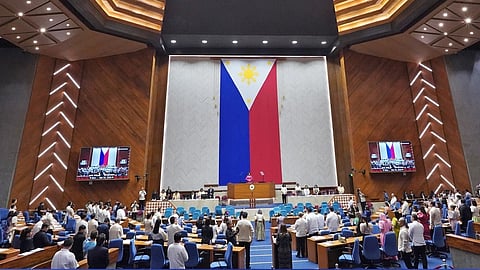
- NEWS
- the EDIT
- COMMENTARY
- BUSINESS
- LIFE
- SHOW
- ACTION
- GLOBAL GOALS
- SNAPS
- DYARYO TIRADA
- MORE

Key officials of the previous administration were a no-show on Monday at the House of Representatives joint panel probe into the so-called gentleman's agreement between former president Rodrigo Duterte and the Chinese government concerning the West Philippine Sea.
Former Defense Secretary Delfin Lorenzana, former National Security Adviser Hermogenes Esperon, and former Executive Secretary Salvador Medialdea all failed to appear before the joint hearing of the House Committee on National Defense and Special Committee on the West Philippine Sea, prompting lawmakers to be puzzled on the uniformity of their absence.
Zambales Rep. Jefferson Khonghun, who initiated the probe, suspected that Lorenzana, Esperon, and Medialdea intentionally skipped the hearing to avoid scrutiny.
"I wonder what they should avoid. Because they are the ones who know if there really is a gentleman's agreement, [and] what is included in it, Khonghun said.
"They should not avoid this matter because it is a big matter especially regarding sovereignty and national territory," he added.
Antipolo Rep. Romeo Acop moved to issue a show cause order against the officials who outrightly snubbed the hearing, which the panel later approved.
Meanwhile, Surigao del Sur Rep. Johnny Pimentel warned that the House would be coerced to utilize its authority to compel the "important actors" in the purported unwritten agreement should they snub anew the summon of the committee.
The panel said it will reinvite Lorenzana, Esperon, and Medialdea along with erstwhile chief presidential legal counsel Salvador Panelo and Duterte's former mouthpiece Harry Roque, citing their "conflicting statements."
Roque made headlines after divulging that his former boss, Duterte, forged a gentleman's agreement with China, which Panelo vehemently denied.
Members of the panel questioned the action of the concerned security departments to send their incumbent officials, whom lawmakers said are not privy to the supposed Duterte-Xi secret pact.
Sorsogon Rep. Wowo Fortes stressed that leaving the issue unresolved would only prompt the Chinese to continuously harass Philippine resupply vessels to justify their action against the Philippines for allegedly violating the deal.
The Department of Foreign Affairs reiterated that the Philippines has not entered into any agreement abandoning its sovereign rights and jurisdiction over exclusive economic zones, including the Ayungin Shoal.
"Any agreement or arrangements would be made only if authorized by the highest level of government. Only the president of the Republic of the Philippines can approve and authorize agreements entered into by the Philippine government on matters pertaining to the West Philippine Sea and South China Sea," DFA Assistant Secretary Aileen Mendiola-Rau said.
Likewise, the Department of National Defense, the National Security Council, and the Philippine Coast Guard said they have no knowledge of or do not have any records in their possession detailing or potentially showing the contours of such a deal.
Put the issue to rest
DND Undersecretary Ignacio Madriaga, meanwhile, appealed to the House to "swiftly" conclude the investigation. He claimed that failing to do so would only allow China to utilize the country's democratic institution to propagate illegal and deceptive narratives designed to undermine the public's support for the government.
"While we are handicap in answering questions or providing related information on this matter, we maintain the view that this house committee investigations should be conducted in the end view of finding out the truth and immediately concluding this issue to rest," Madriaga said.
He concluded, "China is using the supposed agreement and our supposed non-compliance with it to justify their illegal and coercive, aggressive action and behavior in the WPS."
DOJ State Counsel Fretti Ganchoon said that a gentleman's agreement, usually in the form of an oral treaty, can be allowed under international law.
"Oral treaties are allowed under international law. But whether or not it is legal would depend on its contents. That's why we need to know the actual contents," she said.
According to Ganchoon, there are two kinds of treaties under domestic law: executive agreements and treaties proper.
The executive agreement does not need the Senate's concurrence, while the treaty proper must be submitted to the Senate for its concurrence in the president's ratification.
Duterte had denied having an unwritten agreement with China concerning the WPS. He, however, admitted to agreeing to maintain a status quo in the contested waterway, in which no armed patrols would be seen moving in the area to avoid tension and war.
The alleged agreement is widely believed to have given China leverage to shift blame onto the Philippines amid escalating tensions in the WPS.
